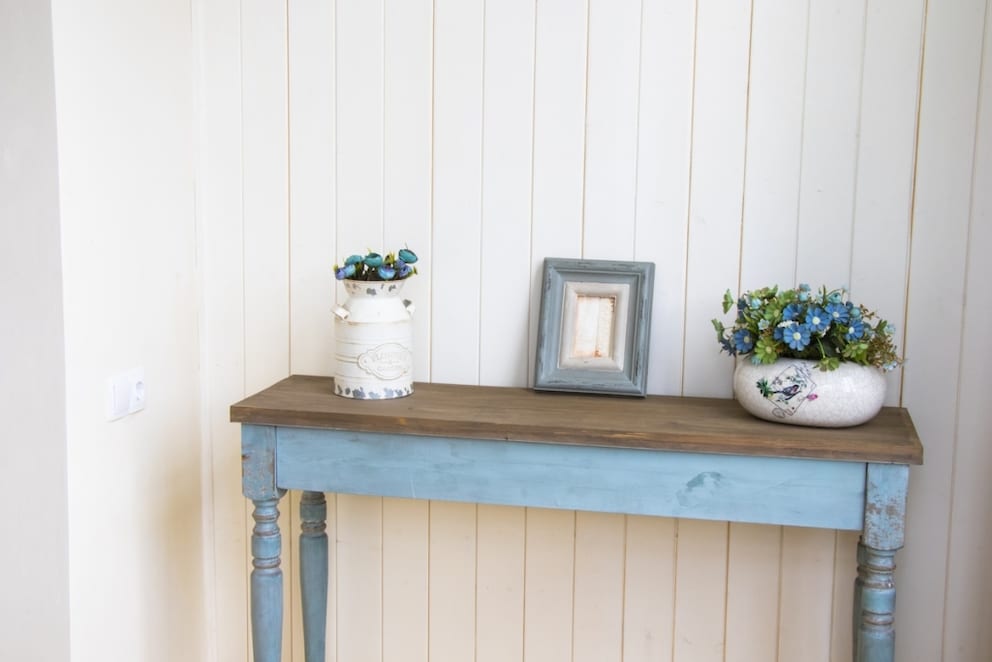July 29, 2024, 12:41 pm | Read time: 5 minutes
If you’re looking to give your furniture or walls a fresh coat of paint that’s both charismatic and sustainable, natural chalk paint is your best bet. Its impressive coverage and versatile application make it a standout choice. So, what exactly is chalk paint?
Chalk paints are particularly trendy among vintage and shabby chic fans. After all, this paint can make furniture and even entire walls elegantly and attractively age, especially visually. The chalk content ensures the final result appears matte, powdery, and simultaneously velvety, rather than shiny. Additionally, the comparatively much more environmentally friendly composition is another reason to opt for a chalk paint finish. For a newly painted surface, one can choose from a wide color palette.
Chalk Paints and the Shabby Chic
Those who want to bring the shabby chic style home should opt for chalk paints. Furniture and walls, in particular, can be enhanced with a beautiful aging process. Often, the colors—true to the style—appear more delicate and subtle rather than bold and impulsive. The warm and cool tones carry a slight gray haze for a picturesque effect. Sometimes, a light coat is applied intentionally, or a special application technique is used after painting to achieve the typical shabby chic style. The look is classically applied to furniture like dressers, nightstands, stools, side tables, chairs, and smaller cabinets.
Where Is Chalk Paint Used?
Chalk paint is appreciated for its versatile applications. It can be applied effortlessly to absorbent surfaces like wood, paper, or clay, as well as non-absorbent surfaces like glass, metal, plastic, or tiles. Chalk paints consistently impress with their high coverage. However, they adhere particularly well to rough or textured surfaces like untreated wood or terracotta.
Additionally, the paint is odorless, making it suitable for any room. A generous coat on the floor, wall, or ceiling can even improve the room climate. Primarily, chalk paint is suitable for indoor use, but for outdoor applications, a surface sealant with wax or a layer of varnish is necessary. A chalk paint finish is especially striking on wall paneling or in kitchens (e.g., on the fronts).

Moreover, the paint has a moisture-regulating ability, meaning it can absorb moisture and release it back into the environment. This is practical because it prevents mold formation on walls. However, chalk paint is not necessarily the best choice for areas with high humidity. Since the paint is not inherently water-repellent, a protective layer specifically for damp areas is needed when used in bathrooms.
The application range of the natural paint also depends on its chalk content: The lower the chalk content, the more matte the paint appears. Matte paints with a varnish content of five percent or less are suitable for lightly used furniture, decorative objects, or ornaments. Eggshell, a second quality level of chalk paints, has a varnish content of about 20 percent, making it ideal for wall paints, frequently used furniture, and floors. For heavily used furniture or surfaces, an additional protective layer is advisable. Over time, chalk paint can be sensitive to dirt and abrasion.
Environmentally Friendly Paint
Compared to common paints and varnishes from hardware stores, chalk paints are considered much more sustainable and environmentally friendly. The water-based paint consists mainly of natural materials like chalk, clay, marble dust, and various pigments such as porcelain clay. All these components are non-toxic and biodegradable. In contrast, conventional paints (e.g., emulsion paint) and varnishes often contain numerous questionable to harmful ingredients like solvents and preservatives.
Also interesting: 5 eco-friendly wall paints as a healthy alternative to conventional coatings
Of course, there are also quality differences among chalk paint manufacturers. The composition is not always entirely based on natural ingredients. Some brands still contain a few less environmentally friendly additives. Therefore, it’s important to carefully check the declaration before purchasing to see if the chalk paint has been tested and checked for harmful substances. Additionally, it’s always advisable to wear a protective mask and gloves during application, as inhaling chalk particles can also be harmful to health.

The Pros and Cons of Clay Paint

The Pros and Cons of Emulsion Paint

5 Interior Tips for a Vintage-Look Kitchen
What Makes Chalk Paints Special in Application
Not only can you quickly give a piece of furniture the popular shabby chic look, but it also requires no preliminary work. You don’t need to sand the surface beforehand, nor is a primer necessary. Depending on the material, a double coat may be required. And because the paint is porous, it doesn’t penetrate the pores of wood surfaces. For an elegant finish, it’s recommended to polish with a cloth after drying, which usually happens exceptionally quickly. This gives the furniture or decorative object an even softer surface and a hint of shine. Even seemingly problematic surfaces like varnished surfaces, veneers, and other coatings can be treated with chalk paint without any issues.
If you want to further protect your painted surface, you can apply a sealant. Varnish is often chosen for this, but a layer of wood wax is gentler on people, the room climate, and the environment. It also enhances the distinctive shabby chic character.

